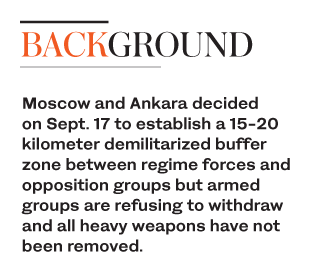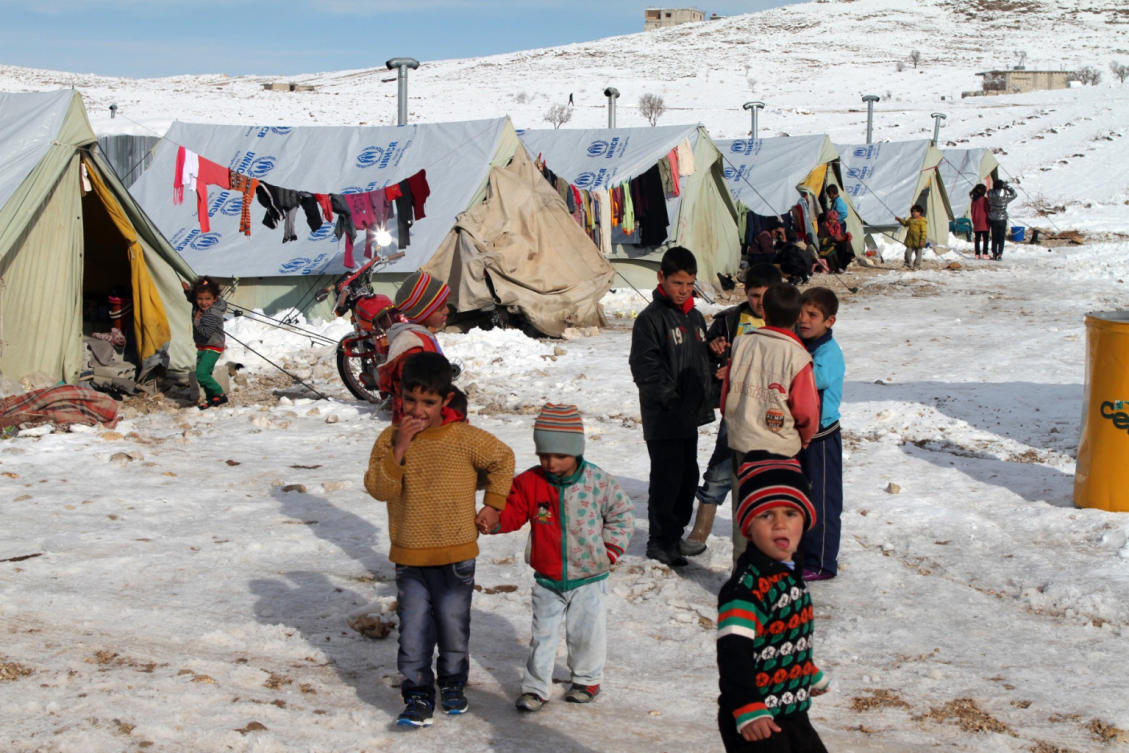ANKARA: As the 11th round of the Astana peace talks approaches, the state of the seven-year conflict in Syria is setting off alarm bells.
Experts interviewed by Arab News underlined the need for Ankara to take more responsibility for convincing thousands of the remaining rebels to withdraw from the area and abandon their heavy weapons as agreed with Moscow in September, as the survival of the truce was under threat from escalating tensions between the warring parties.
Although Moscow and Ankara decided on Sept. 17 to establish a 15-20 kilometer demilitarized buffer zone between regime forces and opposition groups, armed groups are refusing to withdraw and all heavy weapons have not been removed.
Insurgents are blamed by the Syrian regime and Russia for carrying out a suspected toxic gas attack in Aleppo in Syria late on Saturday, injuring more than 100 people. Russian warplanes retaliated by bombing the militants.
Moscow, which said that the attack came from a territory that opposition groups control in the neighboring province of Idlib, announced that it would take up the issue with Turkey, the other guarantor country of the region, which backs some opposition factions.
Russia, Turkey and Iran will convene in the Kazakh capital Astana on Nov. 28-29 to discuss the challenges in Syria, especially the fragile cease-fire in the northern province of Idlib.
 Representatives from the Syrian regime and armed opposition groups will also take part in this month’s meeting amid escalating violence in the buffer zone around Idlib, the last major stronghold of the opposition in Syria.
Representatives from the Syrian regime and armed opposition groups will also take part in this month’s meeting amid escalating violence in the buffer zone around Idlib, the last major stronghold of the opposition in Syria.
As a move to build trust ahead of the Astana peace talks, the Assad regime and opposition groups swapped detainees in northern Syria on Saturday.
Navvar Saban, a military analyst at the Omran Center for Strategic Studies in Istanbul, told Arab News that even before the latest incidents in Idlib, there were several violations from the regime side, with more than 500 attacks since mid-September.
“The Russian reaction was attacking the area and targeting extremist pockets in Idlib, especially Al-Rashideen district, which is part of the Russian-Turkish deal. This is the first time the Russians have interfered since the September cease-fire. But the Turks responded by doing nothing,” he said.
According to Saban, Turkey needs to clear the extremist areas in Idlib as soon as possible because not addressing this issue and having an unstable situation in the area is an open invitation to the regime, Russia and even Iranian-backed militia to use it as an excuse for targeting different locations.
“So, in the next phase, Turkey will be facing a very difficult option, which is clearing Idlib from any security threats. Considering the already fragile security situation in the region, there will be an indirect campaign against all these extremists in the upcoming weeks,” Saban said.
The dominant force among opposition groups in Idlib is Hayat Tahrir Al-Sham, an Islamist alliance led by fighters previously linked to Al-Qaeda.
The reopening of the main highway in the region after the Turkey-Russia deal hugely benefited the extremist group, which according to press reports is still collecting taxes on traffic at the checkpoints. It has also controlled the Bab Al-Hawa border crossing from Idlib into Turkey since 2017.
“From the very beginning, one of the main objectives of the Astana format was to push Turkey diplomatically to bear responsibility, either in cutting off logistical support to militants or deactivating them on the ground during the Russian-backed regime assaults,” Dr. Kerim Has, a Moscow-based Russia analyst, told Arab News.
According to Has, Turkey will likely have to directly take part in a more violent struggle against those radical groups in Idlib to save the cease-fire deal.
“The 11th Astana summit will be crucial for Turkey in the context of the sustainability of this deal. Though the cease-fire violations will probably persist in the region, a large-scale military operation by regime forces is not welcomed yet by Russia, at least until the end of 2018,” he said.
“After the Astana summit the already fragile Idlib deal will be just more fragile, nothing more,” he said.
The formation of a constitutional committee will also be among the hot topics of the meeting as it was anticipated by Russia, Turkey, France and Germany that it would be formed by the end of this year.
But experts are not optimistic about any concrete outcome for the committee, and do not consider it a magic formula to resolve the conflict in the region.
“The establishment of such a committee seems unrealistic at least until the newly appointed UN’s special envoy for Syria creates its own team,” Has said.
He added that the foundation of a constitutional committee will not solely bring peace to Syria, but the daily changing balance of power may have both constructive and devastating effects on the functioning of the political transition process.
Dr. Has said that the solution lies in addressing the regional and global power dynamics surrounding Syria, rather than being dependent on the 50-150 representatives of the Syrian people on the committee.



 Representatives from the Syrian regime and armed opposition groups will also take part in this month’s meeting amid escalating violence in the buffer zone around Idlib, the last major stronghold of the opposition in Syria.
Representatives from the Syrian regime and armed opposition groups will also take part in this month’s meeting amid escalating violence in the buffer zone around Idlib, the last major stronghold of the opposition in Syria.
